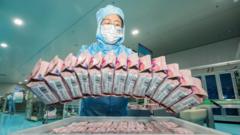Following viral videos demonstrating that many sanitary pads in China are shorter than advertised, manufacturers have issued public apologies and promised improvements in their products. This controversy has sparked broader conversations regarding women's health and quality concerns in feminine hygiene products.
Outcry Over Shortened Sanitary Pads Sparks Apologies from Chinese Manufacturers

Outcry Over Shortened Sanitary Pads Sparks Apologies from Chinese Manufacturers
Major sanitary pad companies in China face backlash as social media reveals discrepancies in product lengths, leading to widespread consumer outrage.
A significant backlash has emerged in China against major sanitary pad manufacturers, igniting a conversation about product integrity and women's health. The controversy began after a series of viral videos surfaced on social media, whereby users measured the lengths of popular sanitary pads and found that most were shorter than the lengths advertised on their packaging.
The trend gained traction, especially on platforms like Xiaohongshu and Weibo, where women shared their findings, culminating in widespread outrage. One user, who posted a video on November 3, highlighted that nine different brands all fell short of their claimed lengths. Her rhetorical question, "Will cutting a few centimeters help you strike it rich?" encapsulated the growing discontent.
An investigation by Chinese news outlet The Paper corroborated these findings, revealing that nearly 90% of the 20 brands evaluated had pads that were at least 10mm shorter than advertised. Furthermore, many contained even shorter absorbent layers, which are designed to handle menstrual flow. Existing national standards allow for a deviation of 4% in length but remain silent on specifications for the absorbent layer's length, raising concerns among consumers.
Amid the mounting complaints, brands like ABC found themselves at the center of the controversy after a customer service representative allegedly dismissed a consumer's concerns by suggesting they simply choose not to buy the product. Following this, ABC issued a public apology for their response and committed to ensuring "zero deviation" in their product specifications. Other brands, including Shecare and Beishute, also stepped forward with apologies, reflecting the mounting pressure from the public.
Chinese state media joined the fray, denouncing the practices of manufacturers for neglecting product quality, particularly as these items are essential for women's health and comfort. "The problems existing in some products on the market cannot be ignored," stated a Xinhua article, emphasizing the gravity of the situation.
Despite being the most commonly used feminine hygiene product in China, the sanitary pad industry has a troubled history concerning safety scandals. Reports of improper manufacturing practices, including a 2016 incident involving a "fake sanitary towel" operation, have tainted public trust. The latest uproar extends beyond mere product specifications and speaks to a broader narrative of women's dissatisfaction with product quality in the market.
As discussions spread across social media, hashtags like "Is it that hard for sanitary pads to tackle women’s needs?" have gained traction, revealing a growing frustration among consumers. Another phrase that has circulated highlights the persistent inequalities faced by women: "Sanitary pads yield a centimeter; women yield for a lifetime." This sentiment encapsulates not only the current controversy but also a deeper critique of how women's products are manufactured and marketed in China.



















